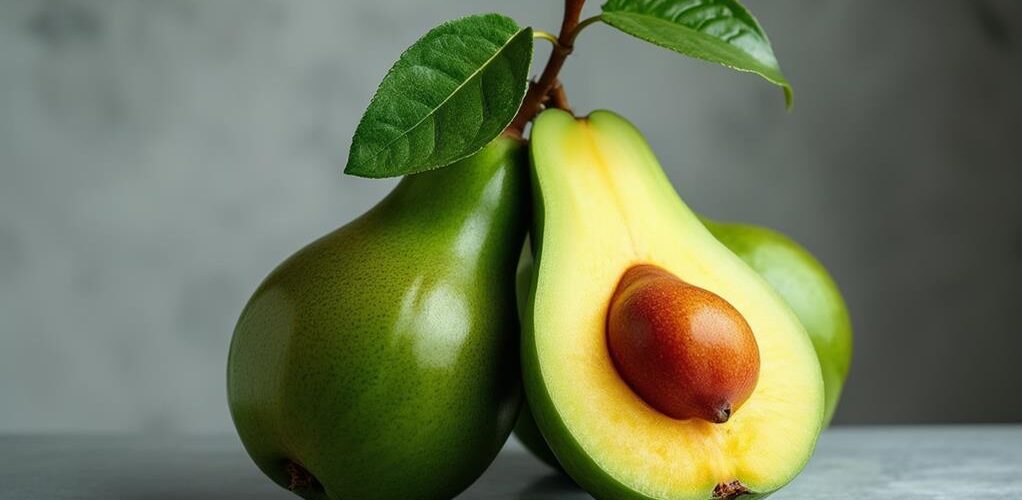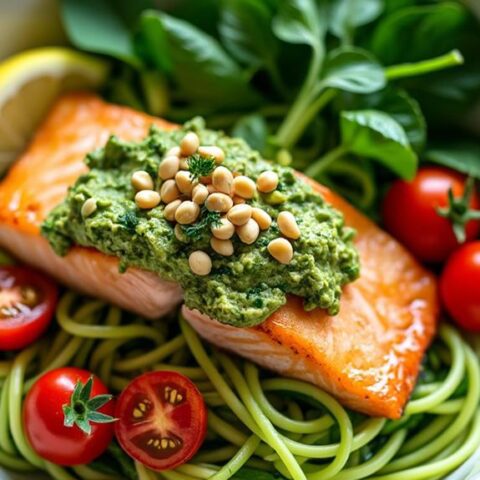
For those on a ketogenic diet, avocados, raspberries, and lemons are excellent fruit options. Avocados offer just 1.5 grams of net carbs per serving, alongside heart-healthy monounsaturated fats and a wealth of vitamins. Raspberries, with 6.7 grams of net carbs per cup, contain antioxidants and fiber that aid in digestion and blood sugar regulation. Lemons contribute about 4 grams of carbs per fruit and provide essential vitamin C and pectin for digestive health. Each fruit not only aligns with dietary restrictions but also delivers unique nutritional advantages, providing further insights into their versatile benefits.
Key Takeaways
- Avocados are keto-friendly due to their low net carbs and high healthy fat content.
- Raspberries offer low net carbs and are rich in antioxidants and essential nutrients.
- Lemons are low in net carbs and high in vitamin C, boosting immunity and aiding digestion.
- Avocados provide significant potassium and fiber, supporting heart and digestive health.
- Raspberries' high fiber content helps regulate blood sugar, making them suitable for keto diets.
Avocados
Avocados are an exemplary choice for those adhering to a ketogenic diet due to their low net carbohydrate content and high nutrient density. With approximately 8.5 grams of total carbohydrates per 3.5-ounce serving, avocados boast nearly 7 grams of fiber, resulting in a net carb count of just 1.5 grams. This makes them an ideal fruit for maintaining ketosis while ensuring the body receives essential nutrients.
Rich in heart-healthy monounsaturated fats, avocados support cardiovascular health and can improve cholesterol levels, highlighting their nutritional benefits. Moreover, avocados are high in potassium, providing around 975 mg per medium fruit, which is essential for maintaining electrolyte balance on a keto diet.
In addition to their favorable macronutrient profile, avocados are a powerhouse of vitamins and minerals. They provide significant amounts of vitamin K, folate, vitamin C, and potassium, all of which play vital roles in various physiological functions, from blood clotting to immune support.
In addition, the high fiber content promotes digestive health and can aid in maintaining satiety, consequently proving beneficial for weight management—a key consideration for those on a ketogenic diet.
Culinary uses of avocados are diverse, owing to their creamy texture and mild flavor. They seamlessly enhance salads, smoothies, and even serve as a base for sauces, offering versatility while keeping carbohydrate intake minimal.
Raspberries
While avocados stand out as a staple for those on a ketogenic diet, raspberries offer a unique alternative for those seeking to incorporate a bit of sweetness into their low-carb regimen.
With approximately 14.7 grams of carbohydrates per cup and 8 grams of fiber, raspberries present a net carbohydrate content of only 6.7 grams. This makes them a suitable choice for maintaining ketosis.
Beyond their low-carb advantage, raspberries are rich in antioxidants such as flavonoids, known for their potential to combat inflammation and support overall health. Additionally, the ketogenic diet is linked with improved cardiovascular health by lowering LDL and triglycerides, and raspberries can contribute to this benefit due to their nutrient profile.
Health Benefits of Raspberries:
- Nutrient-Rich: Raspberries provide essential vitamins and minerals, including vitamin C, manganese, and vitamin K, which are crucial for immune function and bone health.
- Digestive Aid: The high fiber content in raspberries aids digestion, promotes satiety, and helps control blood sugar levels, aligning well with ketogenic dietary goals.
- Antioxidant Properties: These berries are loaded with antioxidants, contributing to reduced oxidative stress and promoting long-term health benefits.
Incorporating raspberries into a ketogenic diet not only enhances meals with natural sweetness but also offers versatile recipe ideas, such as blending them into smoothies or using them as a topping for keto-friendly desserts.
Lemons
Incorporating lemons into a ketogenic diet offers an invigorating and low-carb option that aligns well with dietary goals. With approximately 4 grams of net carbs per fruit, lemons stand as a suitable choice for those adhering to low-carb regimens. Their high vitamin C content not only supports immune function but also provides antioxidants that combat free radicals, enhancing overall health.
Curiously, certain dietary strategies may also play a role in supporting metabolic health and cancer treatment. The presence of pectin in lemons aids digestion and may stabilize blood sugar levels, further contributing to metabolic health.
The lemon benefits extend to culinary applications, where their juice can enhance flavors in meals and beverages with minimal caloric impact—only about 11 calories per fruit. Lemon recipes can therefore be a flavorful addition to keto meal plans, offering both taste and nutritional value without compromising dietary restrictions.
Additionally, incorporating lemon juice into hydration routines may promote weight loss through increased fluid intake and improve skin health by reducing blemishes.
Frequently Asked Questions
What Is the Most Keto-Friendly Fruit?
The most keto-friendly fruit is avocado, renowned for its exceptional keto fruit benefits. With minimal net carbs and high fiber content, it serves as an ideal low carb snack, supporting nutritional goals while maintaining ketosis efficiently.
What Fruits Are Not Keto-Friendly?
Fruits high in sugar content, such as bananas, grapes, and apples, are not keto-friendly due to their raised carbohydrate levels. For effective keto fruit substitutions, opt for lower-carb options like berries, avocados, and olives.
What Fruit Is Good for Keto Breakfast?
For a keto breakfast, avocados are ideal, offering minimal net carbs and beneficial nutrients. Additionally, incorporating berries in keto smoothie recipes, while adhering to appropriate fruit serving sizes, provides antioxidants and flavor without exceeding carb limits.
What Is Lowest Carb Fruit?
The lowest carb fruit is raspberries, with 2.6 grams of net carbs per 19 berries. Their low carb benefits make them ideal for a ketogenic diet, while portion control guarantees best nutritional balance without exceeding carb limits.
Conclusion
To summarize, avocados, raspberries, and lemons emerge as ideal choices for individuals adhering to a ketogenic diet due to their low carbohydrate content and high nutritional value. Avocados provide healthy fats and fiber, supporting metabolic health. Raspberries offer antioxidants and essential nutrients while maintaining minimal sugar levels. Lemons contribute vitamin C and enhance flavor without greatly impacting carbohydrate intake. These fruits align well with the macronutrient requirements of a ketogenic diet, making them suitable for maintaining nutritional balance.










No Comments